Alexander J. Motyl's Blog, page 24
July 12, 2012
Santayana and Remembering the Past in Ukraine
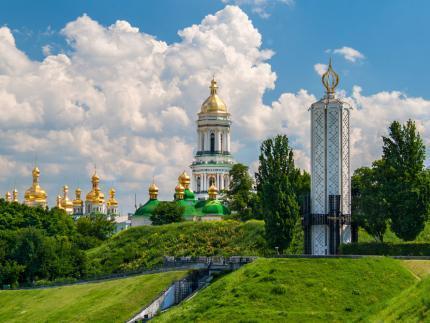
My current visit to Ukraine brings to mind the philosopher George Santayana’s famous aphorism, that “those who cannot remember the past are condemned to repeat it,” and its commonplace misrepresentation, that “those who forget history are doomed to repeat it.”
Let’s start with the fact that these two statements are completely different. Santayana is talking about a capacity or facility. That is, if we lack the capacity or facility to remember—i.e., if we cannot remember—we will suffer certain consequences. In contrast, the misrepresentation asserts that, unless we remember—i.e., if we forget—we will suffer certain consequences. To possess the capacity to remember does not mean that we must always exercise it, that we dare never forget. It means only that we are able to remember the past if and when we want to and, by logical extension, that we are able not to remember the past if and when we want to. According to the misrepresentation, we have no such choice. We must remember, we may not forget—ever—without suffering the consequences.
“Remember, if you desire or need to remember,” is the polar opposite of “Never stop remembering!” The former is future-directed; the latter is past-directed. The former is about living one’s life “in the moment” and in the moments to come; the latter is about living in the past. The former claim says that there may be lessons in the past that we may want to heed. The latter claim insists that the only lessons worth knowing are the lessons of the past. Santayana’s injunction is liberating: it is premised on our freedom and on our freedom to choose how we live, what we remember, and how we cope with the future. The misrepresentation is confining: it is premised on our inability to remember wisely, to exercise choice, and to prepare for the future.
Santayana is right to say that the ability to remember can be useful in avoiding mistakes. Put that way, of course, the claim is hardly as profound as it may at first glance strike us. After all, who would dispute what is ultimately little more than an assertion of common sense? In contrast, the popular misrepresentation is likely to produce the very opposite of what it claims. If all we do is remember and never forget the past, how can we possibly live in the present and anticipate the future? Ironically, never forgetting and always remembering probably dooms us to repeating that which we never forget and always remember.
Which brings me to Ukraine. In Soviet times, the country and its people lacked the capacity to remember. That right was appropriated by the Communist Party and its propaganda machine, which churned out usable versions of a past that rarely corresponded to anything resembling the “real” past. Independent Ukraine seized back that capacity and has been doing little but trying to remember since 1991. Those efforts have produced mixed results. The people who can actually remember the past are mostly dead, much of the documentary evidence of the past has been destroyed by the Soviets and the Nazis, the magnitude of Soviet distortions of the past far exceeds the capacity of Ukraine’s overworked historians to correct them, and the far more institutionalized remembrances of Poles, Russians, and Jews often reduce Ukrainians to bit players, voiceless Others, and brutes.
Has remembering kept Ukraine from repeating past mistakes? Hardly. If remembering were a panacea, Ukraine would be Switzerland, and not Zimbabwe. If we accept as true the claim that non-remembering leads to repetition of mistakes, it does not logically follow that remembering leads to non-repetition of mistakes. So what good is remembering? It may be a great way to build identities and to settle political scores, but remembering is only marginally useful when it comes to solving problems. Look at the Israelis and Palestinians: the more they remember, the less capable they become of solving their problems today. Look at Germany: its commemoration of the Holocaust hasn’t prevented it from being supremely indifferent to human rights violations in Russia. Look at the United States: its obsession with the Founding Fathers offers little guidance to fixing the American economy and polity.
These examples suggest two conclusions. First, that remembering and problem-fixing are very different things and the connection between them is hardly as obvious as misrepresentations of Santayana suggest. And second, that the state, as the key problem fixer, should keep a low profile when it comes to remembering.
For one thing, the state is a clumsy and inefficient instrument for remembering the past. If it can’t pick economic winners, how can it pick historical winners? More important, the state—and, above all, the profoundly corrupt and self-centered Ukrainian state—has its own interests, and these are, after all, to live well at popular expense. When the state promotes remembrance, cui really bono?
This is not to say that, as the Regionnaires insist, the Holodomor should be erased, that World War II should forever remain the Great Fatherland War, that Ukraine should not accept the historical validity of the anti-Soviet nationalist resistance movement, and so on. After all, the Regionnaires want to turn back the clock and reintroduce Stalinist policies of enforced misremembering. But it is to say that the best form of remembering is societal remembering.
Let people remember. Let historians remember. Let people tell historians what they believe is important. And let historians tell people what they think really happened. And let the state remember to fix the country and itself.
July 8, 2012
Remembering an Erased Western Ukrainian Town
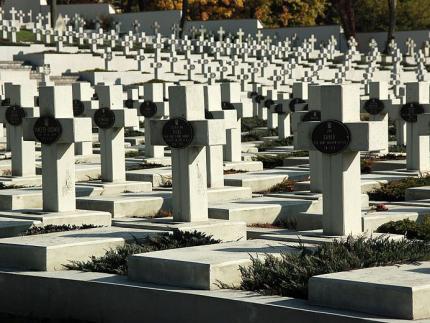
I recently visited the western Ukrainian town my mother lived in. It’s called Peremyshlyany and it’s about 45 kilometers southeast of Lviv.
The town is a shadow of what it used to be. Back in the interwar period, Przemyslany (the Polish name) had a population of about 5,000, with Poles and Jews comprising about 90 percent and Ukrainians the rest. A railroad connected it to Lviv, or Lwow as it was then called, and the town appears to have displayed some class despite the difficult economic times. No less impressive was the political, cultural, and religious vibrancy of all three ethnic communities, each of which had a highly exclusionary sense of identity and all of which lived side by side, didn’t like one another too much, but more or less got along.
World War II and its aftermath changed everything. First the Soviets killed Poles and Ukrainians. Then the Nazis exterminated the Jews. Then Ukrainians and Poles settled old scores. And, finally, the Soviets came back and drove out the Poles and killed many of the Ukrainians. Within a few years of the war’s end, Peremyshlyany had changed completely. Its pre-war Jewish and Polish populations had disappeared, but so too had its pre-war Ukrainian population, most of whom had either died in the war, fled to the West, or been deported to Siberia. Their place was taken by new settlers—from other parts of Ukraine, from the surrounding villages, and from the formerly Ukrainian parts of Poland whose population was expelled in 1947.
Unsurprisingly, virtually all traces of the town’s pre-war vibrancy also disappeared as Soviet totalitarianism forced everything, including history and memory, into its institutional straitjacket. Peremyshlyany’s civil society was replaced with the Communist Party and its monolithic rule. The railroad that connected the town to Lviv had been bombed during the war and was never rebuilt, and a short commute to a metropolis turned into a complicated trek with unreliable buses. Although the economy grew thanks to some industry in the area, Peremyshlyany turned into a deeply provincial place. Things became worse after Ukraine became independent in 1991. The local economy went into a tailspin, unemployment rose, and large numbers of residents fled abroad to find work and send their meager earnings back home. A sense of listlessness and hopelessness descended on those who stayed, while the town itself became increasingly shabby. Those lucky enough to be receiving remittances from abroad have the money to fix up their houses and buy cars. Everything else, alas, looks gray and neglected and in need of a simple paint job.
Peremyshlyany has been “erased,” to use Omer Bartov’s term, several times over. The pre-war Jews and their memories are gone. The pre-war Poles and their memories are gone. The pre-war Ukrainians and their memories are gone. And, now, the post-war Ukrainians, with their Sovietized memories, are also going. The town’s cemetery is about the only thing that’s “alive and well.”
That’s too bad, as the town generated many remarkable individuals. One is my uncle, Bohdan Hevko. He’d spent some five years in Polish prisons in the 1930s, underwent extensive beatings and torture, was arrested by the Soviets on June 22, 1941, and then killed during the “night of long knives,” on June 30th, along with thousands of other western Ukrainian political prisoners. The locals found him at the bottom of a pit, his hands tied behind his back with his underpants and his tongue torn out. Another is my mother’s best friend, Fania Lacher, a Jewish girl who survived the Holocaust by finding refuge in a Ukrainian Catholic monastery, converted to Catholicism, became a nun, Sister Maria, and turned into a leading figure in the underground church in Soviet times. The love of her life was a young Ukrainian nationalist, Volodymyr Zaplatynsky, who helped hide her and her parents from the Nazis and took his life during a firefight with the Soviets in 1944. Still another is Father Omelian Kovch, the parish priest who persuaded the local Gymnazium to let my mother finish her studies tuition-free and who, for his efforts to save Jews, was arrested by the Nazis and killed in the Majdanek concentration camp. The street my mother lived on is named after Kovch, who was beatified by Pope John Paul II in 2001. And, finally, there was Adam Rothfeld, the future Polish minister of foreign affairs who survived the Holocaust in a nearby monastery.
Peremyshlyany is a sad and tragic place. I’m drawn to it precisely because so much of its history has been destroyed by the Nazis and Soviets. I’m also drawn to it because so much of that history lies just below the shabby surface and is struggling to get out. One could do worse than to remember Hevko, Lacher, Zaplatynsky, Kovch, Rothfeld, and the many others who were erased.
July 1, 2012
Germany, East Central Europe, & Morality: Part II
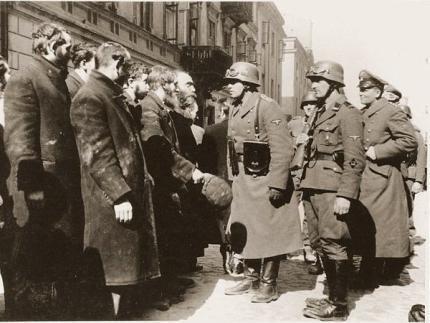
[Part I]
Germans view the interwar period and World War II through the lens of Nazism and the Holocaust. Central and East Europeans view the interwar period and World War II through the lens of Nazism and Stalinism as well as the Holocaust and Communist genocides and atrocities. Their moral issues are infinitely more complex than Germany’s, whose can more or less easily be viewed in black and white terms as a struggle of good versus evil and victims versus victimizers. Some Central and East Europeans were unquestionably bad; others were unquestionably good. But the vast majority—and that includes most Eastern European Jews—existed in a zone of reality that was simultaneously black, white, and every shade of gray. Victims were victimizers and victimizers were victims. Heroes could be villains and villains could be heroes. Most important, the vast majority of people were neither heroes nor villains. They simply tried to survive in awfully complex circumstances that usually offered them the choice between a very bad outcome and an extremely bad one. Ask yourself this: What was the right thing for an East Central European to do during the war? Support Stalin against Hitler, support Hitler against Stalin, fight both, collaborate with both, or try to survive both? From what I’ve seen of the behavior of Western policymakers, pundits, and tenured professors, I don’t doubt for a second that the vast majority of them, and certainly those that preach the loudest, would have opted for collaborating with both while insisting that they were actually resisting valiantly.
It is only if and when Germany and Germans finally come to appreciate their less than altruistic role in East Central Europe and come to terms with their own moral responsibility for that dark past that both Germans and East Central Europeans will be in the position to cooperate fully, and without resentment or rancor, in investigating the entire dark past in the region. It’ll help greatly if moral distinctions and complexities are treated carefully. In his recent Chronicle of Higher Education article, Paul Hockenos quotes a German researcher as saying, with reference to Polish anti-Semitic actions after the German occupation, “The Holocaust didn’t end when the Red Army entered Poland in 1944.” Yes, it did, in the same way that genocides end when their perpetrators stop killing and wars end when attacking armies withdraw. The Holocaust—the name we give to Nazi Germany’s mass destruction of European Jews—was a distinctly Nazi German project and it existed only where Nazi power existed. (That’s why Poles rightly insist that Auschwitz be called a Nazi death camp in Poland, and not a “Polish death camp.”) To suggest that the Holocaust existed in the absence of Nazi Germany is to make the Holocaust coterminous with the history of anti-Semitism, to deprive the Holocaust of all meaning, to transfer responsibility for it from Nazi Germany to the world, and to engage in a brazen act of, ultimately, Holocaust denial. After all, if every act of anti-Jewish violence is part of the Holocaust, then Nazi Germany’s culpability is reduced to zero, Hitler becomes no more responsible than some Ukrainian camp guard, and the tragedy itself becomes diffused throughout all of time.
Just a little bit of reflection shows that without Hitler, without Germany’s embrace of Nazi rule, and without Nazi Germany’s initiation of World War II and pursuit of the Final Solution, there would have been no Holocaust. There would have been anti-Semitism in East Central Europe, there would have been discrimination against Jews, and there may have been pogroms, but there would have been no death camps, no Zyklon B gas, and no mass shootings. The causes of the Holocaust lie within Nazi Germany, the impetus for the Holocaust came out of Nazi Germany, and the moral responsibility for the Holocaust lies with Germany as well. Individual Czechs, Poles, Ukrainians, Hungarians, Lithuanians, Russians, Belarusians, and others collaborated with Nazi Germany, but their collaboration and moral turpitude was the situational product of Nazi Germany’s aggressive and murderous designs on East Central Europe, and not the cause of them. It would never occur to us to extend the blame for European colonialism to Africans and Asians, even though many Africans and Asians were deeply implicated in colonial institutions. It would never occur to us to blame apartheid on the relatively more privileged “colored” and Indian populations of South Africa. It would never occur to us to blame slavery on the blacks Malcolm X called “house Negroes.” And it would certainly never occur to us to place any blame for the Holocaust on the Jewish councils and Jewish police that administered the ghettos. Collaborators may or may not be odious, but they don’t plan or start or serve as preconditions of the wars and genocides in which they are implicated.
Now please “read my lips.” My call for moral distinctions is not a call for moral absolution or moral relativism. Quite the contrary, it is a call for moral responsibility. Let Germans come to terms with their moral failings and let East Central Europeans come to terms with theirs. No one should get off the hook, but let everyone hang on the proper hooks. As I write this, I know full well that readers who prefer their morality served up in the form of Hollywood Westerns will purposely misunderstand me: after all, simplicity is so much simpler than complexity and it’s so much easier to believe that you’re a hero and everyone else is a villain. And besides, there’s nothing like throwing around epithets to end rational discussion and assert moral superiority.
So let me be perfectly clear—again. Central and Eastern Europeans have their own manifold mortal and venial sins to atone for: racism, chauvinism, massacres, and other atrocities, whether committed before the war, during the war, after the war, or today. No nation in the region has a spotless record, and Lord knows the Ukrainians certainly don’t. Those East Central Europeans who aided and abetted Nazi Germany in the Holocaust must be held as responsible for aiding and abetting war criminals as those East Central Europeans who aided and abetted Lenin’s and Stalin’s genocides must be held responsible for aiding and abetting mass murderers. But to make “the Poles,” “the Ukrainians,” “the Russians,” or other Eastern and Central Europeans responsible for “the Holocaust” is to engage in moral relativism, moral shirking, moral buck-passing, and, ultimately, astoundingly bad faith. And the one thing that is sure to transform a well-intentioned German investigator of East Central Europe’s dark past into an “ugly German” is bad faith about Germany’s contributions to that dark past.
June 21, 2012
Germany, East Central Europe, and Moral Responsibility for the Holocaust: Part I
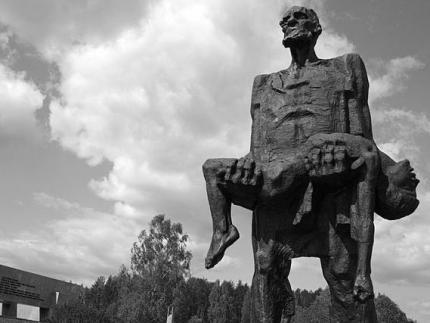
Since June 22nd marks the day Nazi Germany attacked the Soviet Union in 1941, it’s an appropriate time to consider the question posed by Paul Hockenos, an accomplished journalist and political analyst in Berlin, in a recent article in the Chronicle of Higher Education: “Can Germany Help Central Europe Confront Its Dark Past?” Unsurprisingly, the answers his interlocutors provide range from “yes” to “no” to “it depends.” The yea-sayers generally argue that the truth is the truth and, if Germans can help promote it, so be it. The naysayers insist that the Germans have no right to preach morality in a region they devastated in two world wars. The it-depends camp says that truth-telling is fine—as long as it’s done with sensitivity and tact. I come down hard in all three camps
The problem is obvious. The German Reich and Austria-Hungary brought World War I to Central and Eastern Europe from 1914 to 1918. Twenty-five years later, Nazi Germany and Stalin’s USSR dismembered Poland. On June 22, 1941, Adolf Hitler turned on his erstwhile pal and attacked the Soviet Union. In both conflicts, the countries that suffered most from German aggression were Poland, Belarus, and Ukraine, and those that died in largest numbers were Poles, Belarusians, Ukrainians, and Jews.
While there is nothing intrinsically wrong with a German helping East Central Europe “confront its dark past,” it’s not hard to see why such an effort, however well-intentioned, could easily misfire. Germany and Germans represent power, wealth, and arrogance to Central and Eastern Europe in the same way that America and Americans represent power, wealth, and arrogance to the world. And it doesn’t much matter whether the German or American really is powerful, wealthy, or arrogant. Back in 1976, when I was doing a six-month Eurail pass trip through Europe, I spent a month in Frankfurt and Munich. Almost everyone I met held me personally responsible for the Vietnam War, the arms race, racism, and Watergate. Just how a politically ignorant 22-year-old with a shoestring budget could have had so much influence in Washington didn’t seem to trouble my interlocutors, but they obviously knew that, as an American tourist, I necessarily represented American imperialism.
No one likes to be preached to, especially by people, peoples, or states with less than exemplary moral records. Americans like to pontificate about human rights and democracy, and it’s not too surprising that many people in the world find such preaching hypocritical, especially as American power often appears to undermine the very human rights and democracy Washington claims to be promoting. The image of the “ugly American” hardly does justice to most Americans, but there are indeed American behaviors that warrant the label. So if you’re going to preach, you better make sure that you have a spotless moral record. And if you’re not a saint, you may want to pick your words with extra care. That admonition holds as much for self-righteous Canadian scholars and hot-headed German graduate students as it does for opportunistic French politicians and moralizing American heads of state.
Germans shouldn’t be surprised that, like Greeks responding to Germany’s advice on how to overcome their debt crisis, many East Central Europeans view them with some suspicion. People and countries that preach to others have a moral obligation to practice what they preach. Just how committed has Germany been to democracy, human rights, truth, justice, and the like in East Central Europe? Forget the two world wars and the millions of dead. In 1922, Germany signed the Treaty of Rapallo with Soviet Russia and subsequently provided strategic assistance to the Soviet economy and military. In 1938 came the Molotov-Ribbentrop Pact, followed by two years of enthusiastic support of Stalin. West Germany’s postwar policy of Ostpolitik was utterly indifferent to the “captive nations” of East Central Europe, so much so that Bonn even turned its back on Poland’s Solidarity movement. Since 1991, Germany has focused all its energies on Russia and Russian gas, prompting former Chancellor Gerhard Schröder to call Vladimir Putin a model democrat at the height of Ukraine’s Orange Revolution.
In all these instances, Germany has pursued a policy of ruthless Realpolitik, very much in the manner of the United States, China, France, and Russia. That is Germany’s right, and, as some might argue, that is also its imperative. But you see the problem. Practitioners of Realpolitik really shouldn’t preach democracy and human rights—especially to countries that they devastated twice. Even the mayor of Luhansk sensed this, when, back in April, he responded to criticism of his city’s treatment of dogs by German animal rights activist Maja von Hohenzollern with the comment that “when they say we’re bad, let them look at themselves and at what they did during the war.”
It gets even more complicated. Before Germany can help East Central Europe confront East Central Europe’s dark past, Germans should first confront their own dark past in East Central Europe. But have they? Commendably, Germans have devoted an enormous amount of energy to understanding the Holocaust. Unfortunately, their focus on the Nazi destruction of Jews has also tended to blind them to their own very dark past in what Yale historian Timothy Snyder calls the “Bloodlands.” With all the research Germans have devoted to World War II, why did it take an American—and before him, an Englishman, Norman Davies—to point out the obvious: that millions of non-Jews also suffered at the hands of the Nazis? How many German museums devote any attention to the Slavic “Untermenschen”? How many Germans still refer to mismanagement and sloppiness as a “polnische Wirtschaft” or a “Polish economy”? How many know anything about Ukraine? How many care to know anything? Ignorance may be a right, but preaching based on ignorance probably is not.
Many years ago I had lunch with a German diplomat and his wife who were going to be posted to Kyiv. He had never heard of Ukraine’s “national poet,” Taras Shevchenko—a faux pas equivalent to a Ukrainian’s never having heard of Goethe—and she thought Kharkiv was Kraków. That lamentable ignorance has changed among diplomats and scholars, but the abysmally small amount of attention devoted by the German media to Ukraine probably means that it continues with full force at the level of the population in general. Nobel Prize winner Heinrich Böll’s 1949 novel, The Train Was Punctual, suggests that this ignorance has deeper roots. The novel describes a young German soldier’s return to the front in southern Ukraine. As he travels eastward from his furlough, he traces his route on a map and “visits” various cities, towns, and villages in Ukraine. He speaks of Poles and Jews and Russians in great detail, but doesn’t mention Ukrainians once, even though they formed the vast majority of the country and were the people whose farms he and his comrades probably plundered on a daily basis. That German soldier—and Böll arguably with him—didn’t see Ukrainians even when he looked at them. Imagine a trip through the Jim Crow American South without a single reference to the black population.
To be continued.
Photo Credit: John Oldale
June 14, 2012
Urban Politics and Regionnaire Corruption in Ukraine
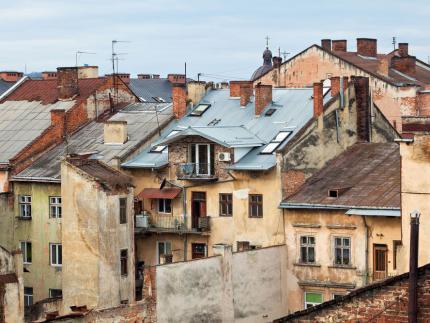
Two recent studies cast interesting light on urban life and Regionnaire policy in Ukraine. Unsurprisingly, most of the cities they misrule are sorely neglected slums, while the only two that matter to them politically—Donetsk and Luhansk—are recipients of government largesse. As it turns out, President Viktor Yanukovych’s Party of Regions would be better termed the Party of Two Cities.
In Kommentarii magazine’s livability rating of 45 Ukrainian cities, those in the bottom half, the 22nd through the 45th, are, with but three exceptions, in the southeastern provinces that support the Regionnaires. The top half, the 1st through the 21st, are all in the central and western provinces that support the national democrats, with the exception of six major Regionnaire-run cities—Sevastopol (3rd), Dnipropetrovsk (5th), Kryvyy Rih (10th), Simferopol (14th), Donetsk (16th), and Odessa (18th). Note the pattern. The Regionnaire-run cities that do relatively well are all large; the provincial cities they misrule are all in the dumps.
The Regionnaire record looks worse if we exclude Sevastopol and Simferopol from the list (the former, as the site of the Russian Black Sea Fleet, gets big bucks from Moscow, while the latter is relatively near the Crimea’s beaches) and look at the number of points the cities score. The highest possible point total is 1,125 (with 45 points per 25 criteria). Kyiv, which is 1st on the list, gets 896 points, or 80 percent of the total. The Regionnaire strongholds, Donetsk and Luhansk, get only 57 percent and 43 percent, respectively. And the cities that score under 50 percent are, with but two exceptions, Regionnaire bastions.
The Regionnaires know where their bread is best buttered and obviously feel free to condemn the rest of the provinces they run to stagnation. These findings are consistent with a study I cited last year that showed that the quality of life is lowest in a coherent swath of territory running from south to east. Of Ukraine’s 27 provinces, Zaporizhzhya was 22nd, Mykolaiv was 23rd, Kherson was 24th, Luhansk was 25th, Donetsk was 26th, and Dnipropetrovsk was dead last.
Keep these ratings in mind as we look at some other data, on state budget transfers to provinces. As it turns out, Donetsk province, which is Yanukovych’s power base and contributes 12 percent of Ukraine’s GDP, received 21 percent of budget transfers in 2010 and a whopping 27 percent in 2011. Luhansk province, which is a Regionnaire power base and contributes a mere 4 percent to Ukraine’s GDP, got 8 percent in 2010 and 11 percent in 2011. The capital city, Kyiv, contributes 18 percent of GDP and, justifiably, received 15 percent of outlays in 2010 and 18.3 percent in 2011.
Several conclusions follow from these data.
First, the claim made by Donbas residents that they “feed” the rest of Ukraine is clearly false. If anyone is being fed, it’s them.
Second, in light of the fact that most southeastern cities are dumps, it’s clear that the subsidies being received by Luhansk and Donetsk provinces are going to Luhansk and Donetsk cities, and not the towns and villages in the provinces. In other words, the Donbas provinces are feeding Donetsk and Luhansk.
Third, and most interesting, the money going to Luhansk and Donetsk is obviously not having the intended effect. Kyiv gets a lot of cash, but it contributes its share to the total pot and is highly livable. In contrast, despite being the targets of Regionnaire lucre, Luhansk and Donetsk rank relatively low on the livability scale.
Why?
Part of the answer may be that they suffered disproportionately from Ukraine’s economic collapse in the 1990s and must therefore catch up more to reach Kyiv’s level. The problem with this explanation, however, is that the Donbas has been highly subsidized by Kyiv since independence in 1991. Every Ukrainian president has known that he must win the region’s loyalty, or at least neutrality, by buying it off with goodies.
So the more convincing answer for Luhansk and Donetsk’s continued underdevelopment must have to do with the nature of their rulers—the Regionnaires (and pre-Regionnaires) who pocket state expenditures with a wild abandon that would make Al Capone’s head spin. Is it pure coincidence that Kyiv’s subsidies to Donetsk exploded at precisely the same time that Yanukovych’s dentist son, Oleksandr, became one of Ukraine’s 100 richest individuals?
The lesson is obvious. Were the Party of Regions a city, it would be at the very top of the heap, with a 200 percent rating. Were the Yanukovych clan a city, it would score even higher.
June 7, 2012
Two New On-Screen Looks at Ukraine
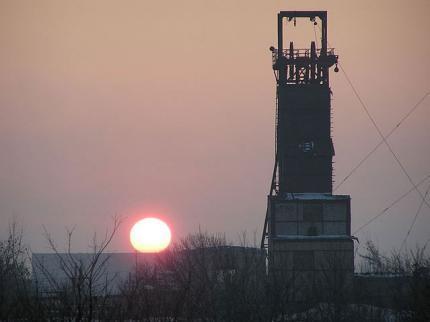
Here are two recommendations from this year’s Kinofest, a New York film festival featuring works from Ukraine and other post-Soviet countries: The Other Chelsea and Firecrosser, both nuanced accounts, as well as subtly savage critiques, of Ukrainian realities.
The Other Chelsea, a documentary by the German filmmaker Jakob Preuss, depicts Donetsk during its soccer team’s march to victory in the UEFA championship in Istanbul in 2009. Firecrosser, a feature-length art film by Mykhaylo Illyenko, is based on the true story of a Ukrainian peasant–turned–fighter pilot who made his way to Canada after World War II and joined an Indian tribe in Ontario.
Preuss’s film features Nikolai Levchenko, the notorious young Party of Regions politico and Donetsk city council secretary who claims to have read Tolstoy’s War and Peace seven times and thinks Ukrainian is a laughable language. Although Jakob and Kolya are on a first-name basis and address each other with the informal you (“ty”), it’s hard to imagine that they’re still the best of buds. Preuss cleverly juxtaposes Levchenko’s lavish lifestyle and absurd habits with the lives of several decent coalminers who lead ordinary lives, work in miserable conditions, are nostalgic about the Soviet past, know that their leaders are crooks, have no idea how to improve their lives, and find solace in the Donetsk soccer team’s victories.
Kolya Levchenko, who cannot have been flattered by Preuss’s portrayal, is depicted as a ridiculous popinjay and transparent demagogue who worries about his neatly trimmed Beatle haircut, can only eat his porridge when it’s cooled, has portraits of Soviet-era military dignitaries and Stalin in his office, carefully cultivates his television image, and lives in the kind of tackily decorated apartment whose Late Regionnaire Rococo style is identical to that of Viktor Yanukovych’s palatial estate outside Kyiv. Kolya first admits to owning a construction firm and then, after Preuss asks him if that isn’t, er, illegal, denies having it.
To their credit, the football-crazy miners see Kolya for what he is—an overly ambitious young man with “criminal” (their word, not mine) ties. Unfortunately, the good people of Donetsk have no idea what to do about the Levchenkos that misrule them. Instead, they seek refuge in soccer. Fittingly, the film ends with the completion of the magnificent Donbas Arena, a soccer stadium built by a Donetsk multibillionaire oligarch, Rinat Akhmetov. Preuss’s message is clear: if you can’t offer the coalminers bread, give them a circus. Unfortunately, the miners almost seem to prefer the circus to bread.
Illyenko’s film features Ivan Dodoka, a Ukrainian peasant from the Poltava region, who becomes an ace pilot, is shot down and captured by the Nazis, is dumped in the Gulag for his “treasonous” stint in a German camp, and escapes by plane to Canada, where he comes upon Indians who take him in and provide him with a home. Although the commercially successful film has been called a “blockbuster” in Ukraine, it’s hardly a Hollywood-style epic with a gun-slinging hero. Rather, as Illyenko put it, it’s a “romantic ballad,” an art film that combines magical realism with history and adventure.
The cleverest part of the film is its treatment of identity and language. Dodoka speaks Ukrainian at home and with some intimate friends. He teaches it to his Tatar wife, who in turn teaches him her language. He also teaches it to the Indians in Canada. Once outside the personal sphere, however, Dodoka speaks only Russian, which is the language of communism, the police, and the military—in a word, of power. Ironically, Dodoka can speak Ukrainian freely, and in that sense be himself, only after he leaves Ukraine. In contrast to the Soviet power-holders, who countenance only Russian, the Indians happily learn how to sing Ukrainian songs and to cook borscht. Illyenko’s message is clear: Soviet rule crushed Ukrainian language and identity, and the only refuge from its oppressive influence could be found in internal or external emigration.
Now read Preuss’s film through the lens Illyenko provides. Preuss’s coalminers have no particular regard for a distinctly Ukrainian identity or for the language. That is their perfect right, of course, but it may also be their malheur. Because Ukrainian represents an alternative to Soviet reality, the bilingual Dodoka knows how to save himself. Tragically, the monolingual coalminers do not.
Photo Credit: Andrew Butko
May 31, 2012
Ukrainian Govt's Monolingualism Diagnosis
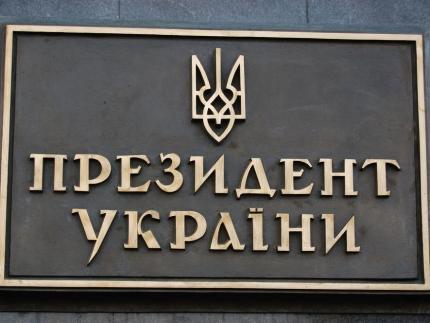
I’ve often remarked on the jaw-dropping stupidity of the Party of Regions currently misruling Ukraine. Whatever they do, they do badly. It’s not just that they’re extremists and thugs; it’s that they’re dumb extremists and cloddish thugs. Smart extremists wishing to destroy Ukrainian identity would never have appointed the widely reviled Dmytro Tabachnyk minister of education. They’d have done it on the sly. Smart thugs who want to destroy the opposition would never have beaten up Yulia Tymoshenko in jail. They’d have arranged for an accident on some country road. Smart crooks would never flaunt the money they’ve stolen. They’d dress like regular folk. Smart supremacists wishing to extirpate the Ukrainian language wouldn’t pass a law that will provoke a patriotic backlash. They’d just discriminate on the sly.
Why are the Regionnaires so dumb? Is it their provincial upbringing amid the smokestacks of the Donbas? Does it come from their Soviet educations? From inhaling too much polluted air? From drinking too much hooch? From getting punched in the nose a few times too many?
Well, I finally have the answer—from none other than the New York Times. In an article titled “Why Bilinguals Are Smarter,” Times science writer Yudhijit Bhattacharjee notes the following:
Speaking two languages rather than just one has obvious practical benefits in an increasingly globalized world. But in recent years, scientists have begun to show that the advantages of bilingualism are even more fundamental than being able to converse with a wider range of people. Being bilingual, it turns out, makes you smarter. It can have a profound effect on your brain, improving cognitive skills not related to language and even shielding against dementia in old age.
Sonofagun! Makes perfect sense to me. The Regionnaires are known for their unwillingness and inability to speak Ukrainian. Indeed, they’re proud of their single-minded dedication to Russian. Little do they know that the result of monolingualism is cerebral flabbiness. Here’s Bhattacharjee:
There is ample evidence that in a bilingual’s brain both language systems are active even when he is using only one language, thus creating situations in which one system obstructs the other. But this interference, researchers are finding out, isn’t so much a handicap as a blessing in disguise. It forces the brain to resolve internal conflict, giving the mind a workout that strengthens its cognitive muscles. … the bilingual experience improves the brain’s so-called executive function—a command system that directs the attention processes that we use for planning, solving problems and performing various other mentally demanding tasks. These processes include ignoring distractions to stay focused, switching attention willfully from one thing to another and holding information in mind—like remembering a sequence of directions while driving.
Did you ever watch Viktor Yanukovych struggle to speak Ukrainian? Heck, you can almost hear them synapses firing as he searches for words, tries to stay focused, switches attention willfully from one thing to another, and is visibly getting smarter. Here’s Bhattacharjee again:
Why does the tussle between two simultaneously active language systems improve these aspects of cognition? Until recently, researchers thought the bilingual advantage stemmed primarily from an ability for inhibition that was honed by the exercise of suppressing one language system: this suppression, it was thought, would help train the bilingual mind to ignore distractions in other contexts. But that explanation increasingly appears to be inadequate, since studies have shown that bilinguals perform better than monolinguals even at tasks that do not require inhibition, like threading a line through an ascending series of numbers scattered randomly on a page.
Have you ever wondered why Regionnaires never thread lines through ascending series of numbers while they doodle in Parliament? Now you know. They couldn’t pull it off and they’d probably lose their tempers, break their pencils, and—heaven forbid—press the wrong button and vote for the opposition.
One final Bhattacharjee quote:
The key difference between bilinguals and monolinguals may be more basic: a heightened ability to monitor the environment. “Bilinguals have to switch languages quite often—you may talk to your father in one language and to your mother in another language,” says Albert Costa, a researcher at the University of Pompeu Fabra in Spain. “It requires keeping track of changes around you in the same way that we monitor our surroundings when driving.” In a study comparing German-Italian bilinguals with Italian monolinguals on monitoring tasks, Mr. Costa and his colleagues found that the bilingual subjects not only performed better, but they also did so with less activity in parts of the brain involved in monitoring, indicating that they were more efficient at it.
In other words, bilingualism is good for you. It’s not just right and reasonable and liberal in a country such as Ukraine, but it’ll make the country a better place to live. Sounds like a no-brainer to anyone who is smart or wants to be smart.
Who but a monolingual Regionnaire could have a problem with that?
May 24, 2012
Ukraine’s Opposition Declares War
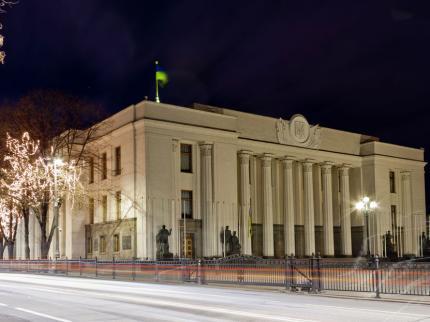
Ukraine’s united democratic opposition recently adopted an Action Program that defines its goals in stark opposition to the Regionnaire regime of President Viktor Yanukovych. Since the democrats can lose the October parliamentary elections only if the Regionnaires engage in massive fraud and get away with it, the Action Program may be a harbinger of things to come.
The preamble says it all:
Today Ukraine needs change as never before. All power in the country belongs to the criminal-oligarchic regime headed by president [sic] Yanukovych, who is leading Ukraine toward an abyss.
Ukraine is ever more becoming a country without laws, rights, freedom, and justice. It is no longer a rule-of-law, democratic, social state.
The national wealth created by the labor of the whole society is being divided to the benefit of a few scores of families.
The resources that belong to current and future generations of Ukrainians—land, minerals, forests, rivers, invaluable landmarks of history and culture—are being privatized, sold, and stolen.
Individuals get billions, foreign accounts, and real estate. The majority gets miserable wages, growing prices and fees, and ruinous taxes. The rich are getting richer, while the poor are getting poorer. This is the essence of Yanukovych’s policies. Constitutionally granted human and civil rights have become a fiction. Courts have become puppets in the hands of the ruling regime. The militia, instead of protecting citizens from criminals, protects the power of criminals from citizens. The opponents of the regime are subject to political repression.
Today’s power holders treat citizens as a herd supposed to labor quietly for their enrichment. They believe that power can be bought with money and that the more money they have, the stronger will be their rule.
They think they will remain in power forever and that Ukraine will always be as it is today.
They are wrong.
The criminal occupation of Ukraine will be put to an end. We will remove the Yanukovych regime from power by means of honest and democratic elections.
For the first time in the history of Ukraine the opposition political parties have joined together in a large and powerful team whose primary goals are:
A JUST STATE, AN HONEST GOVERNMENT, A DIGNIFIED LIFE
I’d say the diagnosis is spot on and that the slogans, which so closely mirror those that motivated Ukrainians to join the Orange Revolution in 2004, are smart. Ukrainians want to live well, of course, but what they want above all is justice, honesty, and dignity. They want to be treated as human beings, and not as a herd of dumb Regionnaire cattle.
The document then goes on to list the opposition’s seven immediate policy goals:
We will give people the opportunity to work and earn a dignified wage.
We will introduce dignified wages and just pensions.
Corruptioneers will be taken to task.
We will bring back justice.
Instead of expensive Russian gas, there will be cheap Ukrainian energy.
We will remove the criminal-oligarchic Yanukovych regime.
We will place the government under the control of society.
All these goals are worthwhile, but all but two will take time. Points one and two—dignified wages and pensions—can happen only if the Ukrainian economy gets going again. Point three will be difficult because corruption has become an integral part of Ukrainian life. Point five requires a massive transformation of Ukraine’s corrupt and inefficient energy sector. Point seven presupposes the emergence of a post-Soviet citizenry that actually wants to take charge of its life.
In contrast, points four and six—bringing back justice and removing the regime—can be accomplished rather more quickly, and it is they that will define the opposition’s policies should it be permitted to run the Parliament. Naturally, the Regionnaire faction in Parliament will resist tooth and nail legislation intended to place them all in jail. Scuffles, blockades, and other extralegal measures will become the order of the day and both the legislature and the government could become completely dysfunctional. Yanukovych will then have to rule by decree, thereby assuming complete responsibility for his incompetent regime. Under conditions such as these, Anybody But Yanukovych will be a shoo-in for president in the elections of 2015.
What chance is there that Yanukovych might decide to save his skin by working with the opposition and divesting his family of some of its ill-gotten gains? The record of the world’s tyrants suggests that they would rather go down in flames, and drag their countries with them, than go straight. Just look at Anastasio Somoza, Mobutu Sese Seko, Robert Mugabe, Slobodan Milosevic, Vladimir Putin, and Benito Mussolini. Worse, Yanukovych’s own inability to learn—consider his stubbornly self-destructive behavior regarding European demands that Yulia Tymoshenko be released—suggests that he, too, will prefer to crash and burn rather than admit to being wrong.
Well, crash and burn he will if he stays on course. Let’s just hope that, this time, the democrats who eventually replace him don’t repeat the mistakes of the Orange revolutionaries by dithering and squabbling and, instead, immediately take measures to free the economy from the stranglehold of corruptioneers and bureaucrats and, above all, incorporate the much abused Ukrainian citizenry into the process of government and self-government.
May 18, 2012
A Looming Soccer Disaster in Ukraine?
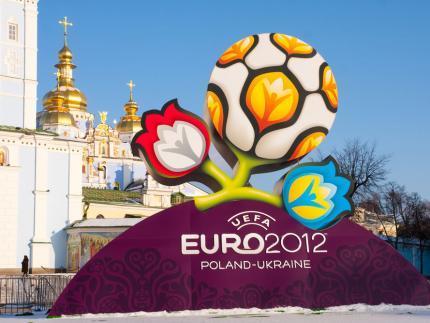
Hats off to the Regionnaires for pulling off the impossible! The Euro 2012 soccer games in Ukraine and Poland seemed like a sure bet. Infrastructure would be built, tourists would come, and Ukraine’s economy—and image—would get a boost. True, it was likely that the democratic opposition would take advantage of the games to publicize its plight, but that seemed like a potentially minor disruption of a public relations coup for President Viktor Yanukovych and his Party of Regions regime.
What could possibly go wrong? As it turns out, everything—thanks to Regionnaire greed and incompetence.
For starters, the Regionnaires built too few medium-category hotels, preferring five-star establishments for the rich and tent cities for the hoi polloi. Not surprisingly, with demand for regular rooms far outstripping supply, hotel operators raised their prices to astronomical levels, expecting Europeans to pay thousands of euros per night. Many fans began thinking twice about spending any significant amount of time in Ukraine, deciding it would be cheaper to fly in and out for particular games. A large number of European soccer teams came to the same conclusion and set up camp outside Ukraine.
Growing awareness of Ukraine’s booming sex industry and of Regionnaire proclivities for troglodyte sexism reinforced European skittishness about visiting a country whose boorish leaders possess antediluvian attitudes about women and their role in a modern society. The imprisonment of opposition leader Yulia Tymoshenko only appeared to demonstrate Regionnaire hostility toward women and democracy. Worse, Regionnaire intransigence on the issue suggested that the regime was purposefully snubbing European values and blithely making itself an international pariah. Unsurprisingly, once several European leaders called for boycotting the games as long as Tymoshenko languishes in jail, anti-Yanukovych bandwagoning asserted itself with a vengeance—even Russia’s famed human rights champions, Vladimir Putin and Dmitri Medvedev, joined—and it quickly became evident that no one in Europe wants to give the Ukrainian president the benefit of the doubt. As one European analyst put it, “What was a few years ago called ‘Ukraine fatigue’ in the EU, a feeling of disappointment with the failure of pursuing long-promised reforms by Yushchenko and Timoshenko, has now turned into active irritation with Yanukovich’s administration. Not a very good mood to attend the forthcoming football championship for Ukraine.”
Finally, the bombs went off in Dnipropetrovsk. It was bad enough that traveling to Ukraine could be misconstrued as support of an authoritarian, repressive, sexist regime, but once the explosions took place and it seemed even remotely possible that the regime might actually have orchestrated them in order to quash protest, the thrill of watching soccer had to be weighed against the possibility of experiencing bodily harm—if not from bombs, then from the inexperienced non-English speaking Ukrainian militiamen tasked with maintaining law and order.
To be sure, the games in Lviv, Kharkiv, Donetsk, and Kyiv will take place, and the tourists will come, but it’s pretty clear that they will be far fewer than the million-plus that were expected just a few months ago. The hoped-for economic boom will not occur, and the vast amounts of money the Regionnaires poured into stadiums and infrastructure (about $13 billion, or 8 percent of GDP, of which 80 percent came from the state budget), as well as purloined in the process (cost overruns were often 300 percent), will not be recouped. For an economy that is barely standing on its last legs, the loss of revenue and the prospect of default is especially bad news. The Regionnaires will try to shift the blame to those dastardly Europeans, or perhaps even to the imprisoned Tymoshenko, but everyone will know who messed up—again.
Unlike the tourists, the journalists will come. But, contrary to Regionnaire expectations of good press about their brilliant handling of the games, you can be pretty certain that foreign correspondents will produce copy invariably critical of the regime. The games will not be a story—unless the Ukrainian team manages to pull off an upset victory. But Ukraine’s descent into authoritarianism, rampant Regionnaire corruption, Tymoshenko’s imprisonment, violence against women, Yanukovych’s palatial lifestyle, the sex industry, and many other dark sides of life in Yanukostan will be. Expect FEMEN, the vocal group of young bare-chested feminist radicals, to be in the news on a daily basis. Expect English-speaking representatives of the unified democratic opposition to be briefing foreign correspondents on the rotten underbelly of Yanukovych’s Ukraine. Expect the journalists to be single-minded in their pursuit of stories that show the Regionnaires as the thugs and crooks they are, have been, and always will be.
The games will be a public relations disaster for the Yanukovych regime. As the People First Foundation puts it, “Euro 2012 is rapidly turning into the farce of the century with thousands of unsold tickets, government delegations threatening a boycott and the national reputation being dragged through the gutter and all because of the arrogance of those in power who believed it would all be so simple.”
And just think: a few short months after, Ukrainians will go to the polls in parliamentary elections. Yanukovych, who has centralized all power in his own hands, will have no one to blame but himself for the Regionnaires’ remarkable record of failures. Expect voters to agree.
May 11, 2012
The Inevitability of Regime Fraud in Ukraine's October Elections
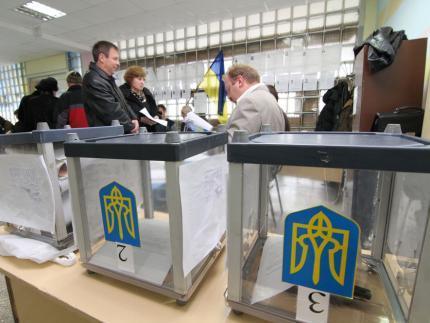
At a recent meeting with David Kramer, the Executive Director of Freedom House, President Viktor Yanukovych “underlined” that the parliamentary elections scheduled for October 2012 “will take place honestly and openly.”
Don’t believe him for a millisecond. It’s not just that Yanukovych has a decidedly casual relationship with the truth. It’s that he and his Party of Regions know three things that all Ukrainians also know: that absolutely everything depends on their winning the elections, that they will never win in fair and free elections, and that the only way they can square that particular circle is by cheating.
The elections matter for two reasons. First, the fewer Regionnaires become deputies, the more Regionnaires will be open to prosecution for corruption, malfeasance, theft, and thuggery. Everyone in Ukraine knows that a seat in Parliament is the only real guarantee of immunity for crimes committed inside and outside that august institution. So it’s small wonder that the going rate for a slot is up to a million dollars. What looks like a lot of money to you and me is peanuts for the crooks that occupy the Ukrainian Parliament’s empty seats. Now, most Ukrainian parliamentarians have been known to line their pockets for years, but Regionnaire avarice takes the cake, both because they run the entire country and have nothing to fear from anybody, and because the greed of provincial politicos who finally make it to the big city probably exceeds that of non-provincial politicos with some sense of decorum.
Second, Yanukovych’s chances of getting reelected as president depend directly on continued Regionnaire control of Parliament. Here’s why. A recent public opinion survey by the Rating Sociological Group shows him losing in hypothetical run-offs against every respectable democratic politician: 30 percent to 36.6 percent against the imprisoned Yulia Tymoshenko, 29 percent to 38.1 percent against Front of Change leader Arsenii Yasteniuk, and 28.1 percent to 36.6 percent against boxer-turned-politician and head of the Ukrainian Democratic Alliance for Reform, Vitaly Klychko. Yanukovych manages to beat only his extremist alter ego: the head of the Svoboda party, Oleh Tyahnybok, by 31.2 percent to 24.4 percent. Now that most Ukrainians realize that Yanukovych is little different from the Regionnaires that misrule Ukraine, his chances of reversing these trends by the time of the next presidential elections in 2015 are nil.
Worse, the scandals keep on coming. The latest two nails in his political coffin are stories about the floating palace Yanukovych uses to entertain guests while at his sultan’s estate outside Kyiv and his preposterously over-decorated hunting lodge. The floating palace cost 75 million hryvnya (about $9 million), is decked out with elaborate chandeliers and marble floors, and belongs to a shady firm, Tantalit, affiliated with—guess who?—Yanukovych’s two crony sons, Viktor and Oleksandr. The lodge also appears to have some connection to Tantalit. You can be pretty sure that the president’s coalminer constituency from the Donbas will never be allowed to set their dusty feet in either place.
So what’s a hopelessly underperforming leader who prefers expensive kitsch to simple justice to do? Dictatorship is appealing, but it’ll never work in a big country whose people hate you so passionately. That leaves shenanigans, and the primary form of maneuvering back into office is to have Parliament change the constitution and assume responsibility for electing the prez. But you see the problem. If the opposition controls Parliament after October 2012, Yanukovych will have to face the voters in 2015 on his own merits, and it’s pretty clear that Ukraine’s next leader will then be President Anybody But Yanukovych.
Which brings us back to the parliamentary elections of October 2012. Since the Regionnaires are as unpopular as Yanukovych, their chances of winning a majority—and, especially, a constitutional majority of 300 of 450 seats—are zip if they play fair and square. Of course, fair play is antithetical to the Regionnaire mind-set, so expect anything but in the run-up and during the ballot. They’ve already begun gerrymandering districts, placing their people in charge of election commissions, buying off the opposition, and setting up dummy candidates and dummy parties. The latest Regionnaire gimmick was to get the Constitutional Court to limit the voting rights of Ukrainians living abroad. Since there are some five to six million such adult Ukrainians, many of whom have adopted Western values, the ruling is a transparent attempt to lower the democratic opposition’s vote total. But fraud is unlikely to work. After all, even if, as New York City’s Boss Tweed famously said, you vote early and often, no one will believe that a party with 16 percent voter support could possibly win an election. Heck, you can falsify 5 to 10 percent of the vote with impunity, but can you get away with 30 to 40 percent? No way.
Worse, the world will be watching these elections very carefully. The Europeans will want to know whether Yanukovych’s supposed desire to join Europe will be reflected in actual procedures. Russian democrats will want to know whether Yanukovych will try to emulate Vladimir Putin. The Americans will expect fair and free elections as a sign of the Yanukovych regime’s willingness to atone for its imprisonment of democratic politicians.
Ukraine’s president and ruling party are caught between a rock and a hard place. If they don’t cheat, they lose. If they do cheat, they also lose. Given such unenviable prospects for Regionnaire rule, expect Yanukovych’s cronies to resort to targeted violence and intimidation and develop contingency plans. Don’t be surprised if, like Yulia Tymoshenko, more democratic politicians get beaten up. Don’t be surprised if, as in Dnipropetrovsk, more bombs go off. And don’t be surprised if the Regionnaires intensify their theft of anything that’s not screwed to the floor, smuggle sacks full of dollars to the West, and go on a real estate shopping spree in London, Paris, Vienna, and the Riviera.
Most of all, don’t be surprised if the Regionnaires cheat for all they’re worth. And, after all they’ve purloined these last two years, they’re worth trillions.
Alexander J. Motyl's Blog
- Alexander J. Motyl's profile
- 21 followers



